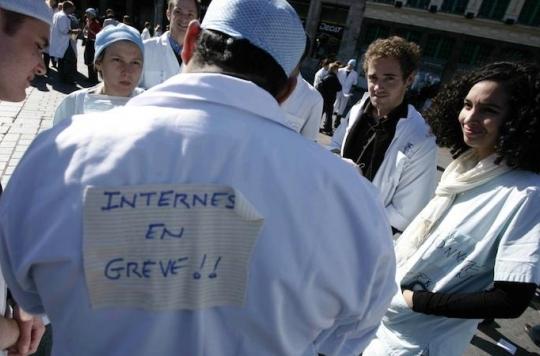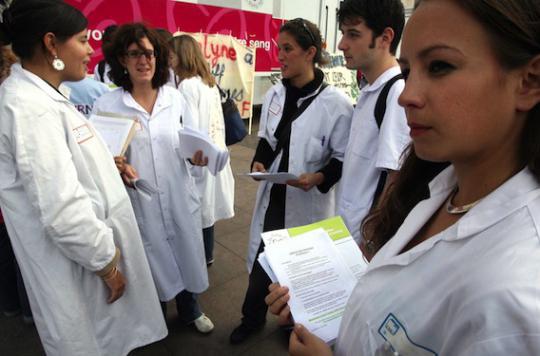Hospital practitioners complain about the lack of attractiveness of careers and working hours. Suddenly, they went on strike, at the call of their inter-union.

Anger is roaring among hospital practitioners! Yesterday, the anesthesiologists of the SNPHAR-E union (associated with its inter-union Avenir Hospitalier) went on strike to protest against the future health bill. And this Wednesday, the union welcomes the success of this day of strike, the demands of which focused on the lack of consideration of hardship, and the lack of attractiveness of hospital careers. According to his figures, there were between 60-70% of strikers in anesthesia and up to 40% in other specialties. why actor looks back at the persistent malaise of professionals at the hospital who seems to have reached its climax.
More productivity and less staff
Asked by why actor, SNPHAR-E confided that it did not agree with Marisol Touraine’s health bill presented today to the Council of Ministers. On the hospital “where nothing changes” according to these doctors, they recall that hospital practitioners (PH) always suffer the “perverse” effects of “Hospital, patients, health, territories” law (HPST) of 2010, and the application of T2A at 100%.
In the field, they thus observe a permanent pressure on the nursing staff to increase productivity. And at the same time, the number of doctors is not keeping up. The statutory vacation rate for full-time hospital staff would be 23%. And 25% in anesthesia-resuscitation.
Between 60 and 80 hours per week
To understand these figures, we must look at the status of hospital practitioner. This is indeed unattractive. For example, all the hours worked by PH are not paid. However, several surveys have already shown that these specialists often work between 60 and 80 hours per week. Contacted by the editorial staff, Dr Nathalie Cros-Terraux, vice-president of SNPHAR-E, underlines that this working time in the hospital imposed on the PH is done outside of any legality. Europe provides, it is true, a maximum hospital duration of 48 hours per week for doctors in a directive.
Listen to Dr Nathalie Cros-Terraux, vice-president of SNPHAR-E: ” The day if we work 10 hours we have 2 half-days. At night if we work 2 p.m. we also have 2 half-days. In this context, we greatly exceed 48 hours. “
Hospital practitioners flee public service
Because of this climate of fed up, hospital practitioners are even starting to flee the public hospital. Some to go and exercise in the private sector. Thus in 2013, the direction of the Assistance Publique-Hôpitaux de Paris (AP-HP) recognized that there were resignations of the 24 professors who left their establishments definitively. As a result, the departures of Prs (resignations, retirements …) were twice as numerous as in 2009 at the AP-HP.
Another symptom of this discomfort, the association Scientific asspro recently revealed in a study that 30% of French surgeons and anesthetists have a stress level greater than 8 out of 10. And a quarter of specialists in the operating room apprehend in the morning the workload of the day to come. “A phenomenon which is all the more amplified since they have the feeling that they are only doing work”, underlines Dr Nathalie Cros-Terraux.
Listen to Dr Nathalie Cros-Terraux : ” Before, we had a time that also allowed us to go to the wards. And to see patients pre-op or post-op. Today, we only do the operating theater. Like robots … “
France threatened with sanctions by Europe
So, to put an end to their discomfort, hospital practitioners have concrete proposals. At SNPHAR-E, doctors claim, for example, a single rate for the hardship allowance (for on-call duty and on-call duty). And a single rate for additional working time, that is to say beyond the service obligations. They plead for a sum of 650 € as a day of temporary doctors. Finally, they are fighting for the maintenance of their 19 days of RTT, often threatened.
Claims that the public authorities should listen to because if France, in the future, does not resolve this problem of overwork in the hospital, it risks sanctions.
In March 2013, the European Commission had indeed indicated to France that it was giving it two months to reduce the working time of interns to 48 hours / week. She threatened France to be prosecuted before the Court of Justice of the European Union (CJEU) for breach of the law if she did not react.
A threat remained a dead letter since in August, the Intersyndicat des internees judged the project to reform working hours at the hospital “illegal”. According to ISNI, it did not take account of their proposals, nor of European law.
.















